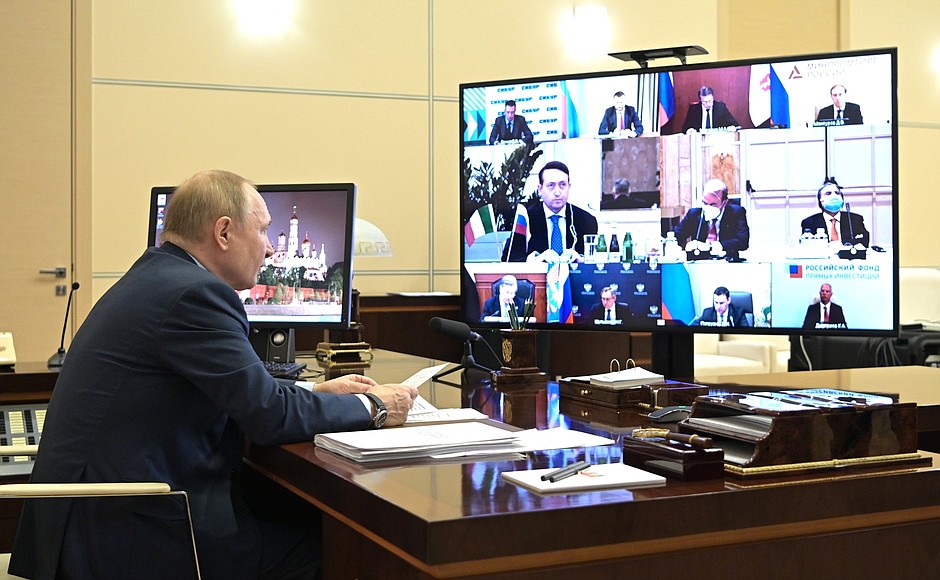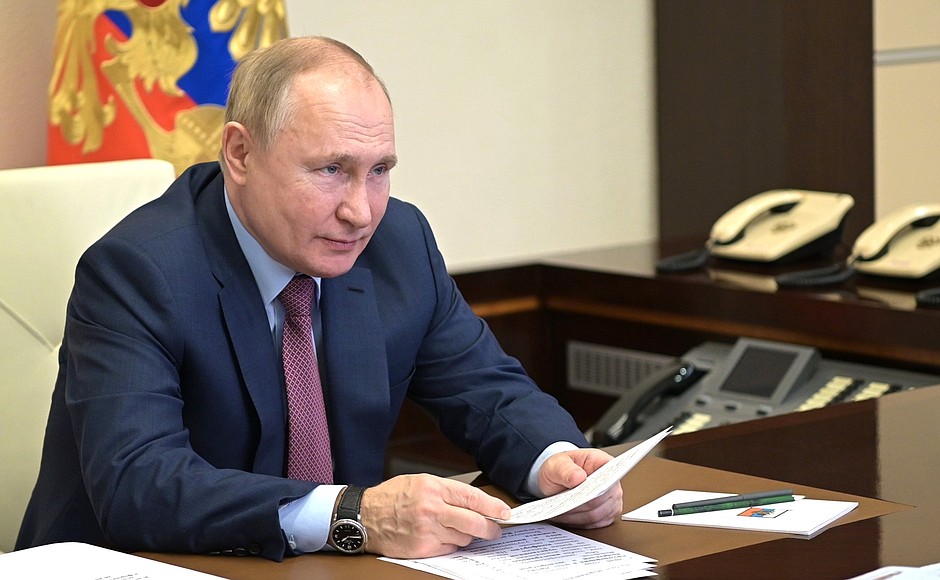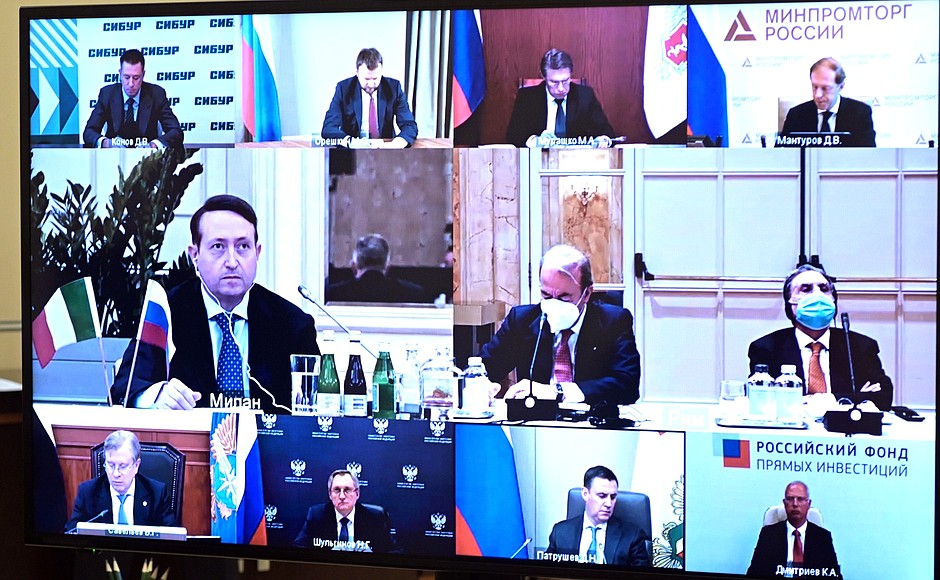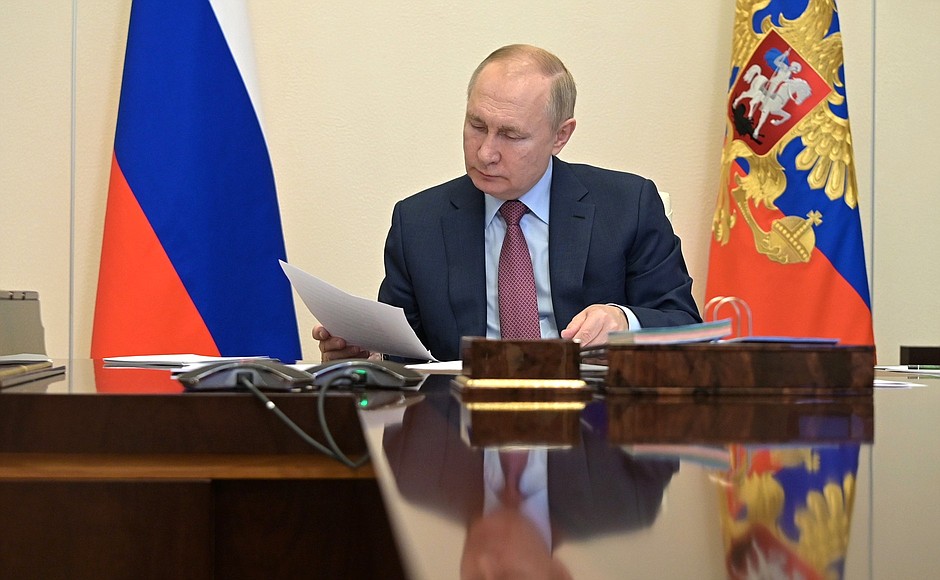President of Russia Vladimir Putin: Colleagues, good afternoon.
I am delighted to have this opportunity to meet with leading Italian entrepreneurs, our colleagues and friends.
When we met in October 2018, we had a constructive conversation about the prospects for expanding trade, economic and investment ties between Russia and Italy. Many of your useful recommendations have been taken into account in our ongoing work to create a favourable climate for growth and development of the economic environment, to improve economic regulation and the business climate that I just mentioned, including attracting foreign investment.
Of course, due to the coronavirus pandemic, business contacts have become difficult, and the generally volatile situation in the global economy is not helping with new projects and initiatives. However, we can state with satisfaction that our countries have managed to maintain cooperation on the economic track at a fairly high level. In January-November 2021, bilateral trade grew by 53.8 percent to $27.5 billion. I fully expect it to exceed $30 billion when we finish the calculations.
Colleagues, I propose focusing today’s discussion on your concerns – topics that are of the essence for our colleagues, investors, entrepreneurs working in Russia and interested in expanding commercial ties with our country, to discuss the most pressing aspects of Russian-Italian economic cooperation.
I would like to emphasise that we consider Italy one of Russia’s leading economic partners. Your country is Russia’s third largest trade partner in the EU. Italian companies’ investments in Russia’s economy amount to about $5 billion, and Russian investments in Italy are estimated at about $3 billion.
The Russian-Italian Investment Platform, which was established in 2019 jointly with the Russian Direct Investment Fund to finance large capital-intensive joint projects, is operating very effectively.
There are some 500 Italian companies in Russia. The range of industries where they operate is truly impressive: power generation, steel, oil and gas, petrochemical industries, helicopter manufacturing, high technologies, agribusiness, transport infrastructure, banking, insurance and many other sectors.
In particular, we are satisfied with the successful development of cooperation with Italian companies and banks in large-scale energy projects, such as Yamal LNG and Arctic LNG 2, in which over 60 Italian companies are involved. Italian producers of high-tech equipment are also actively contributing to the Vostok Oil project, which Rosneft is carrying out in the Krasnoyarsk Territory in the north of Russia.
Russia is a reliable supplier of energy resources to Italian consumers. In 2021, Gazprom delivered 22.7 billion cubic metres of natural gas to Italy or much more than in 2020, when it supplied 20.8 billion.
I would like to point out that Italian energy companies continue working with Gazprom on the basis of long-term contracts and can therefore buy Russian gas cheaper, I would even say much cheaper than spot market prices, which have increased considerably against the backdrop of a cold winter and a supply shortage.
There are also good prospects for boosting Russian-Italian business partnership in other energy sectors, primarily the development, use and commercialisation of renewable energy sources.
Italian business has invested some 500 million euros in the construction of wind farms in three Russian regions: the Stavropol Territory, Rostov in southern Russia and the Murmansk Region in the north. The Murmansk wind power project will be used to produce green hydrogen for export to Europe.
Incidentally, Russia has recently taken a number of major steps towards creating a low-carbon economy. You may be aware of our plans, which I have already mentioned, to achieve carbon neutrality by 2060 while maintaining sustainable economic growth.
Russia has considerable resources and technological potential, which we intend to use for developing green energy. Within the next few years, pilot projects to produce hydrogen with a low level of greenhouse emissions and to use it in the power industry, transport and industrial sector will get underway. The Hydrogen Energy Development Concept is being put into practice, and by 2035 Russia may become one of the world’s biggest producers and exporters of hydrogen.
We are interested in foreign, including Italian, businesspeople feeling as comfortable as possible in the Russian market. We are taking measures on a systemic basis to improve the business and investment climate. An important role in this sense is played by the Foreign Investment Advisory Council under the Government of Russia. For the last 26 years, this Council has worked on improving the conditions of business enterprise.
Russia regularly holds numerous international economic forums. You know all of them: I am referring to the St Petersburg and Eastern forums, the INNOPROM expo in Yekaterinburg, and others. By tradition, Italian companies are actively involved in these events. Last year, a special session of the Russian-Italian business dialogue was organised on the sidelines of the St Petersburg International Economic Forum, while at INNOPROM Italy was a partner country.
I would like to specifically mention the fact that Russia’s capital, Moscow, has submitted a bid to hold the world’s fair, EXPO 2030. We know, of course, colleagues, that Rome is also a candidate city. Moreover, Italy already has hosted a world’s fair. Our country has never done this, although it has been involved in this event for the last 170 years. Russia is an invariable participant in the international exhibition movement and was represented at the first World Expo in London in 1851. Well, we will compete with you, we certainly will!
Colleagues,
We believe that the key factor in Russia’s investment appeal is its macroeconomic stability, and we intend to prioritise the effort to ensure this stability both now and in the future.
I would like to stress that the global economic crisis caused by the pandemic has affected our country less severely, less strongly than other states. Largely, this was possible thanks to the structural reliability of the Russian economy. According to estimates, the GDP growth, as of the end of last year, will amount to approximately 4.5 percent. Unemployment in Russia has stayed around the historical low of 4.3 percent.
I would also like to note that the companies operating in our country actively use the most diverse support mechanisms; they use them because we offer them both to our domestic and foreign partners. The foreign corporations that localised their production facilities in Russia are eligible for additional benefits and tax privileges in the special economic zones and can operate on the basis of special investment contracts. In addition, a preferential treatment for issuing residential permits to foreign investors will come into effect in the middle of this year.
Of course, the fact that Russia and the European Union have not yet completed the mutual recognition process for their vaccines and vaccination certificates is not at all conducive to more active business contacts and trips.
In this context, I would mention the joint Russian-Italian comparison of vaccines carried out at the Italian National Institute for the Infectious Diseases, which showed that Russia’s Sputnik V demonstrated the greatest virus-neutralising titre with respect to the Omicron variant and proved again its high effectiveness.
Colleagues,
The Russian side is represented at today’s meeting by the key economic ministers and CEOs of major domestic companies. Naturally, they will take into account all the problems concerning you and keep in contact with you in order to promote your further successful work in Russia.
Let us get down to work, I mean directly to our discussion. I thank you and give the floor to President of the Italian-Russian Chamber of Commerce Mr Vincenzo Trani.
And, of course, I want to stress again that members of the Russian Government, my colleagues, and, as I have said, heads of our major companies, which are often your partners, are in contact with us right now. And I will gladly give the floor to them during our discussion, as I did previously, so you will directly hear the opinions of your Russian colleagues regarding the prospects for developing Russian-Italian economic ties.
Please, go ahead.
President of the Italian-Russian Chamber of Commerce Vincenzo Trani: Good afternoon, Mr President.
Thank you very much for the opportunity that the Italian-Russian Chamber of Commerce and I have today. Thank you for responding to our request.
I wanted to use today's event to involve major Italian companies, including officials from other associations which, together with the Italian-Russian Chamber of Commerce, are creating the Italian system.
I especially wanted to engage the main committee of Italian-Russian entrepreneurs, which is headed by Mr Tronchetti Provera, who is sitting next to me. We organised this event.
I am particularly grateful to you because the companies that are here with me now find it important to have this opportunity and engage in a direct dialogue. Of course, this is important not only for them, but for many other companies as well. As you said, almost 500 companies are investing and working in Russia. They really wanted to participate in this meeting, but, unfortunately, were unable to do so.
This is why we included two associations on the list of speakers that are working with us, building a dialogue and a bridge between Russia and Italy. These associations are Confindustria and GIM Unimpresa.
The Italian-Russian Chamber of Commerce has been in existence for 57 years now. Our goal is to create a dialogue, including during times when things are not going too well. Sometimes, the need for a dialogue is even greater during challenging times. However, the ties that exist between Italy and Russia and between our peoples are even older than our states. Even before the Italian Republic was formed, business between Italians and Russians existed.
Relations between Russia and Italy in recent years have been unfolding amid complex international circumstances. We have faced challenging situations and developments many times, and every time we overcome them through dialogue. I think at moments like these a dialogue, especially a dialogue between businesses and between us and businesses, is our main tool.
I always tell my fellow entrepreneurs, since I am an entrepreneur myself and became an entrepreneur in Russia, I always tell them that the best investment and, of course, the best businesses are created in times of adversity. I have always used this logic in my business. So, today I support and advise many other entrepreneurs who are looking at Russia as a country of opportunity, to have a good look at Russia’s potential, which, in the wake of the global coronavirus crisis, is, of course, ready for a “new renaissance,” including with regard to Italy.
I would like to turn it over to my colleague, Marco Tronchetti Provera, CEO and Executive Vice Chairman of Pirelli and Co-Chairman of the Russian-Italian Committee of Entrepreneurs, who will talk about developing and exploring new opportunities and building a new dialogue.
<…>



